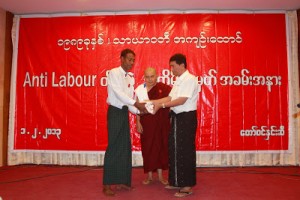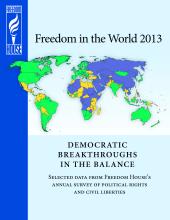Posts Tagged ‘Political Prisoners’ (426 found)
Kachin Farmer Arrested and Tortured in Burma – Free Mading Zau Bawk!
Burma Campaign UK today called for the immediate release of Mading Zau Bawk and other remaining political prisoners in Burma. Mading Zau Bawk is a 23-year-old Kachin farmer who was arrested in May 2012 and tortured brutally by the military-backed government in Burma […]
• • •Burma’s Prisoner Review Must Include All Those Unfairly Detained
The Burmese government’s decision to form a committee to review political prisoner cases is a step in the right direction but the review needs to have a much wider reach, Amnesty International has said.
The government yesterday announced it would proceed with setting up the committee, which will look into granting amnesties to political prisoners […]
• • •Burma Political Prisoner Committee Welcome, But Serious Questions Remain
Burma Campaign UK today welcomed the announcement by the office of President Thein Sein that a Committee will be formed to review political prisoner cases in Burma.
The formation of the committee was originally announced in November, with a promise that arrangements would be discussed by the end of 2012. Five weeks after this deadline, the President has again announced the committee will be formed […]
• • •Commemoration Calls Attention to Political Prisoners’ Struggle
 On 1 February, a group of former political prisoners held a public forum in Rangoon to commemorate their protest against forced prison labor in Tharawaddy Prison in 1989. The group was arrested and imprisoned after the 1988 popular uprising that was brutally crushed by the military regime. The “Anti-Labor Protest”, as they called it, was an act of resistance to the first time after the 1988 uprising that prison authorities imposed hard labor on political prisoners. It was also the first time after the uprising that prisoners stood up for their rights and the prison authorities’ first use of widespread and brutal torture against them.
On 1 February, a group of former political prisoners held a public forum in Rangoon to commemorate their protest against forced prison labor in Tharawaddy Prison in 1989. The group was arrested and imprisoned after the 1988 popular uprising that was brutally crushed by the military regime. The “Anti-Labor Protest”, as they called it, was an act of resistance to the first time after the 1988 uprising that prison authorities imposed hard labor on political prisoners. It was also the first time after the uprising that prisoners stood up for their rights and the prison authorities’ first use of widespread and brutal torture against them.
On 17 November 1989, 250 political prisoners were transferred from Insein Prison to Tharawaddy Prison in Pegu Division. On 23 November, prison authorities began to force the political prisoners to perform hard labor, but 6 people refused to do so. Authorities separated them into two groups, severely beat each of the prisoners and placed them in solitary confinement. The following day, other political prisoners demanded to see the 6 who had been taken away. When their demand was rejected, they refused to perform hard labor as well. As with the 6 original protesters, they were also sent to solitary confinement and tortured terribly. Three of these protesters died shortly after they were released from prison […]
• • •Burma: Rights Abuses Endanger Reform
Government’s Commitments to Change Falling Short
Burma’s human rights situation remained poor in 2012, despite some noteworthy actions by the government to adopt rights-respecting reforms, Human Rights Watch said in its World Report 2013 released today […]
• • •January Political Prisoners of the Month Have Been Released
Burma Campaign UK today welcomed the release of Aung Hmine San, Than Htike, Min Naing Lwin and Thein Aung Myint who were arrested for protesting without permission. However, Burma Campaign UK urged the military-backed government in Burma to repeal the current protest law which doesn’t give genuine rights and freedom to protest […]
• • •Myanmar: Respect Appeal of Deceased Phyo Wai Aung to Have His Name Cleared
We are taking the unusual step today of writing to the four chairpersons of parliamentary committees in Myanmar pursuant to a letter sent to the four of you dated 26 November 2012 by Phyo Wai Aung, the young man falsely accused and tortured to confess of involvement in the April 2010 Myanmar New Year festival bombing in Yangon […]
• • •A Protest Law With Genuine Rights and Freedom is Needed in Burma
Burma Campaign UK today urged the Foreign Office Minister Hugo Swire MP to call in the Burmese ambassador to Britain to question him regarding why people are still being arrested under the right to protest law in Burma. Burma Campaign UK also urged the Foreign Office Minister to demand the military-backed government pass a protest law with genuine rights to protest and to form a joint domestic and international board with the involvement of the UN to investigate the numbers of political prisoners remaining in Burma’s jails […]
• • •Freedom in the World 2013: Burma
 In April 2012, opposition leader Aung San Suu Kyi and her National League for Democracy (NLD) swept parliamentary by-elections, having boycotted the main elections in 2010. The NLD’s inclusion in the political process was accompanied by the continued liberalization of the media, internet, and economy, and by the sporadic release of political prisoners. Burma’s relations with foreign democracies also improved during the year, with several significant visits by international leaders. Despite this progress, ethnic and sectarian violence flared in parts of the country, and armed conflicts between the government and some of the country’s ethnic minority militias remained unresolved […]
In April 2012, opposition leader Aung San Suu Kyi and her National League for Democracy (NLD) swept parliamentary by-elections, having boycotted the main elections in 2010. The NLD’s inclusion in the political process was accompanied by the continued liberalization of the media, internet, and economy, and by the sporadic release of political prisoners. Burma’s relations with foreign democracies also improved during the year, with several significant visits by international leaders. Despite this progress, ethnic and sectarian violence flared in parts of the country, and armed conflicts between the government and some of the country’s ethnic minority militias remained unresolved […]
Burma: Investigate Death of Former Political Prisoner
AAPP is deeply saddened to learn about the passing of former political prisoner Phyo Wai Aung. He passed away due to liver cancer at his home in Rangoon on 4 January 2012, only 5 months after his release from Insein prison where he served 2 years […]
• • •








 All posts
All posts